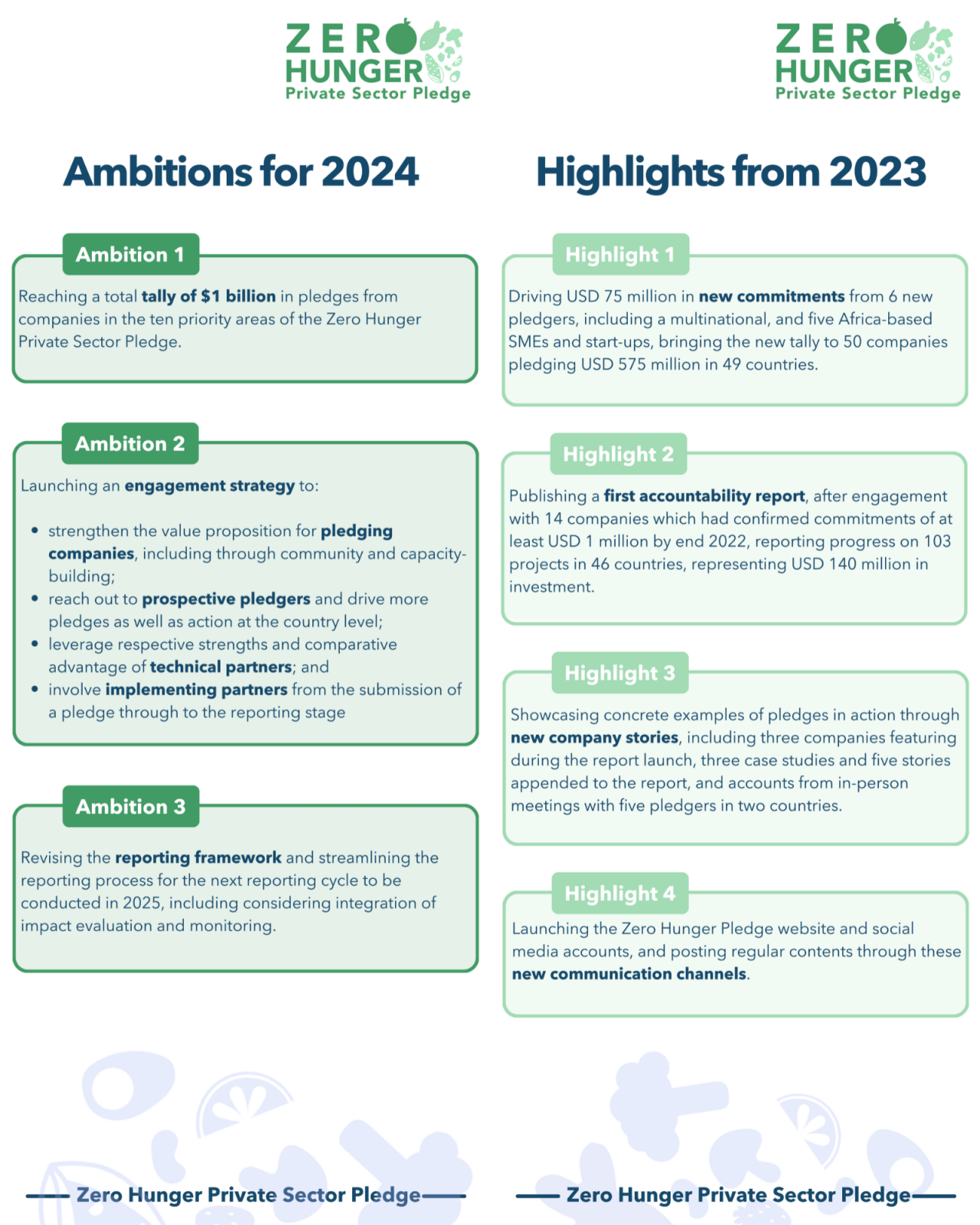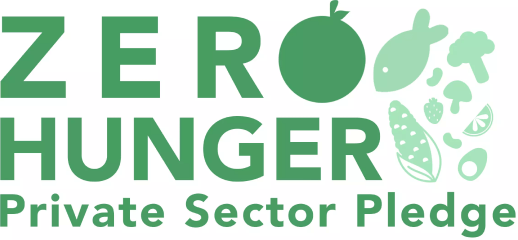
The Zero Hunger Pledge ambitions for 2024
An estimated 690 million people suffered from hunger when the Zero Hunger Private Sector Pledge launched in 2021. Since then, the number had risen to 735 million. If we hope to achieve SDG 2: Zero Hunger by 2030, we must all step up our efforts to effectively end hunger.
The private sector is critical to achieving this goal. The Zero Hunger Private Sector Pledge mobilizes business and calls for the alignment of business investments with high-impact solutions for the sustainable eradication of hunger.
Two years into the Pledge...
The Pledge emerged from Action Track 1 – Ensuring access to safe and nutritious food for all – of the inaugural United Nations Food System Summit. It requires companies to pledge investments targeting priority countries with high-impact interventions that evidence has shown to be the most catalytic to reach SDG 2: help marginalized populations and small producers benefit through training and resources (empower the excluded), encourage sustainable practices that are economically viable (on the farm) and reduce post-harvest losses (food on the move).
Two years after its launch, the Pledge has made significant strides in mobilising the private sector, raising a promising $608 million from 50 companies for projects in 48 countries.
But much remains to be done.
Bold ambitions for 2024
Partners of the Zero Hunger Private Sector Pledge met in February 2024 to discuss the next steps for the initiative. One message emerged that all partners echoed: “Business as usual is not enough – even if it’s aligned with the evidence base.” This prompted the group to reiterate its intention to:
unlock impact and additionality, even if the primary focus remains on alignment of private investments with high-impact intervention areas and priority countries;
effectively engage with existing and new stakeholders through more deliberate outreach and collaborations; and
communicate a clearer and stronger value proposition for partners and pledging companies alike.
Renewed commitment from partners galvanised the group to boost the ambition of the Pledge. First, the Pledge aims to reach a total tally of $1 billion worth of pledges aligned with the 10 high-impact intervention areas in 90 priority countries by the end of the year. Second, the Pledge will verify that pledges are converted into action, in the spirit of the accountability exercise launched in 2023. Partners will revise the Pledge’s reporting framework and prepare the reporting process for the next cycle in 2025.
To achieve these aims, the Pledge will deepen its engagement with various stakeholders. With companies, it will reinforce the Pledge’s value proposition, through the launch of a comprehensive communications toolkit, the development of a community of pledging companies, and a renewed focus on country-level activities. With technical and implementing partner organisations, the Pledge will focus on re-engagement while also exploring new partnerships and leveraging opportunities for increased efficiency and synergies.

Solid achievements in 2023
The level of ambition for 2024 builds on the solid achievements from 2023. In the past year, the Pledge continued to advance towards its goal of mobilizing business commitments to eradicate hunger:
Companies committed more than $100 million to the Zero Hunger Private Sector Pledge, bringing the latest tally to 50 companies committing a collective $608 million in 48 priority countries. A number of African-based SMEs and start-ups committed to the Pledge, highlighting a broad engagement to ending hunger through more resilient and sustainable food systems.
But the Pledge doesn’t stop at driving commitments from companies. In 2023, the Pledge published its first accountability report, From Pledge to Action. The report revealed that, throughout the period 2021-2022, 14 companies had deployed $140 million through 103 projects in 46 priority countries across the African, Asian, and Latin American regions.
In parallel to the reporting process, the Pledge also collected stories and case studies showcasing successful examples of businesses aligning investments with high-impact interventions to achieve SDG 2. This included multimedia stories from pledging companies in Malawi and Tanzania posted on the Pledge’s website and social media as well as case studies featured as appendix to the accountability report.
The Pledge launched its website in early 2023, and its social media accounts soon thereafter. Initial engagement from a wide audience, ranging from pledging companies to technical and implementing partners in the Pledge, has been encouraging.
With seven more years to go ...
The Zero Hunger Private Sector Pledge, like the global agenda on sustainable development, will end in 2030. With seven years to go before that timeline elapses, much remains to be done. That is why the Pledge, through its partners’ involvement and its companies’ investments, is determined to redouble efforts to enable and enhance private sector participation in the global fight against hunger and malnutrition.
Learn more about the Pledge | Pledge now | Contact us
